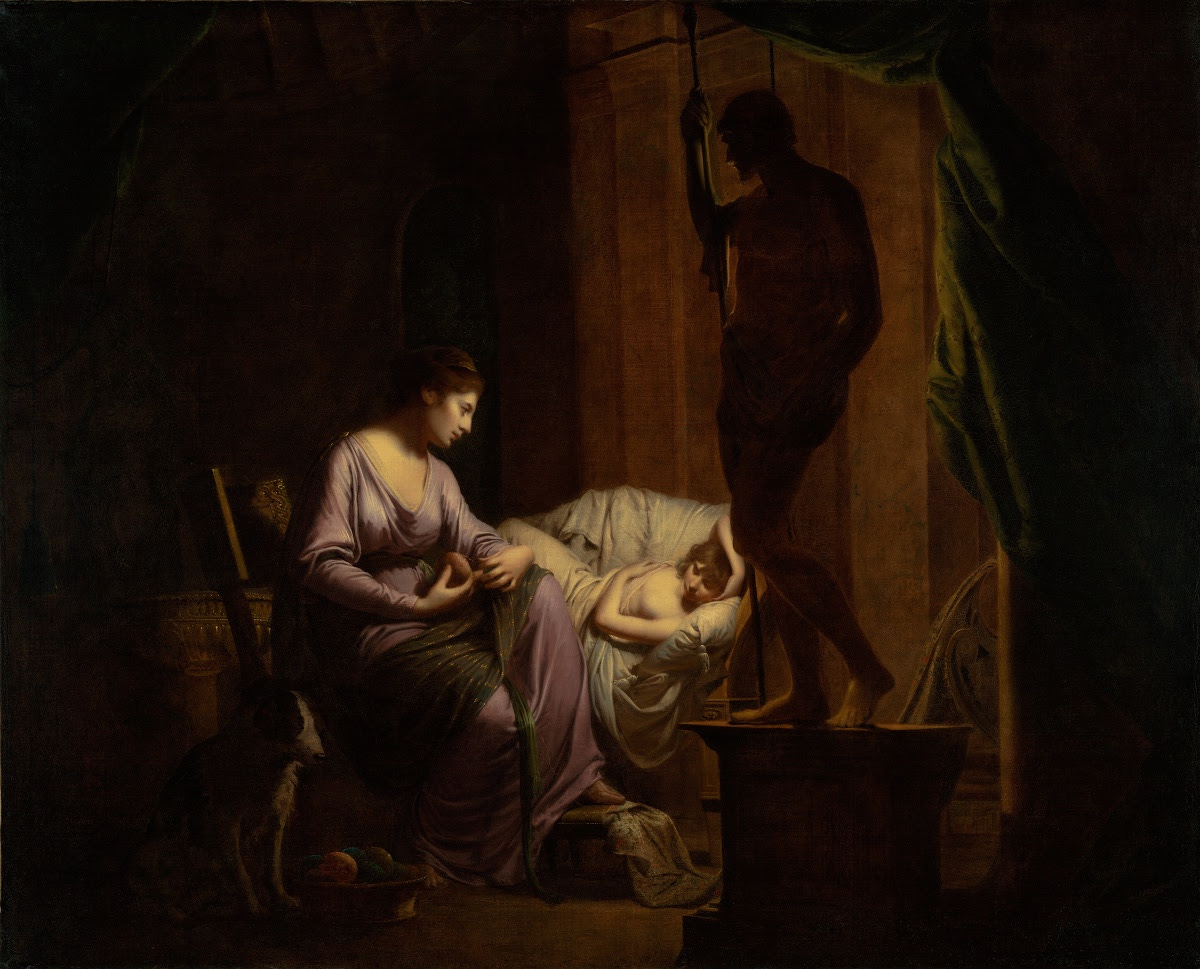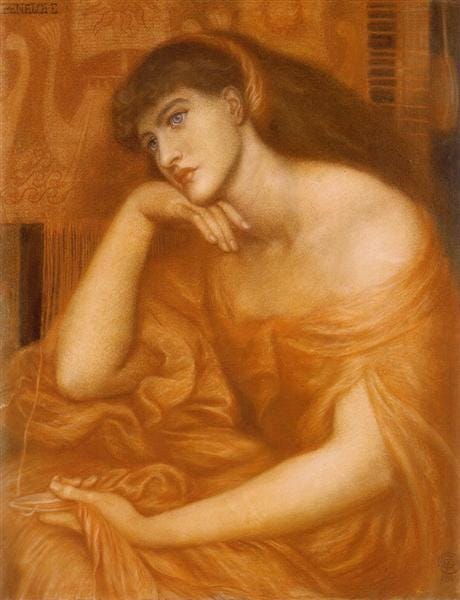Hey Ancient Echoers!
First of all I want to say a hugee thank you, because there are over 600 of you subscribed now, and that’s insane to me! A big thank you to everyone who has been here awhile, and a warm welcome to everyone new<3
I’m also sorry I’ve been slightly absent over the past few weeks; I’ve been picking up a lot of work which has meant that this blog has fallen by the wayside a bit, not by choice! But we’re back in business just in time for Christmas, and this week I want to talk about Penelope.
THE CONTEXT
By far the most common version of Penelope’s myth comes from, you guessed it, Homer’s Odyssey. As Odysseus’ wife, there’s a fair amount of information regarding Penelope in this enormous text.
Ancient accounts, as they so often do, vary, and one of them has a plot twist which we know from Madeline Miller’s Circe, which I wrote an article about a few weeks ago. In this version of the myth, Telegonus (Odysseus’ second son by Circe) sets out to find his father, but mistakenly kills him. Just how he managed to accidentally kill the very man he was looking for remains a mystery to me.
Telegonus returns to his mother’s island with Penelope and Telemachus (Pen and Odysseus’ son), very apologetic. In the end, Circe goes off travelling with Telemachus, and Penelope falls in love with Telegonus.
Yes, you heard. Her husband’s illegitimate son.
Greek mythology never ceases to amaze me.
A stunning retelling of Penelope’s myth was written by the one and only Margaret Atwood in 2005, titled The Penelopiad. In it, Penelope is allowed to tell her version of the story from the Underworld, where she roams the Fields of Asphodel eternally.
It’s probably the most iconic feminist retelling of any woman in Greek myth, and perhaps the pioneering novel of the genre. I did a presentation on it in uni, but I won’t bore you with that (yet). I would highly recommend giving it a read.
THE MYTH
Penelope is the daughter of Icarius of Sparta and the nymph Periboea, and, of course, the wife of Odysseus. Together they had a son, Telemachus.
When Odysseus is called away to fight in the Trojan war (which I will write about one day when I’m feeling strong, I promise), Penelope is left to defend their tiny island of Ithaca all alone, along with their infant son. Ithaca, for reference, is a teeny tiny island just off of Kefalonia, and was known for being very rocky, sparse and full of goats.
Not exactly a big name in Grecian powers.
Odysseus is away for ten years fighting Agamemnon and Menelaus’ war, and while he’s gone, every nobleman in and around Ithaca begins vying for Penelope’s hand.
Miss Pen is forced to come up with a plan, and quick, so (presumably panicked) she tells all of her suitors that they have to wait for her to finish weaving her father-in-law’s funeral shroud before they start trying to hit on her.
I feel as though I should also mention that Odysseus’ father Laertes is alive and healthy at this time, so I’m not sure what he would have made of this whole funeral shroud business.
So Penelope spends her days weaving, but unbeknownst to her suitors, she spends her nights un-weaving, the result of which is a funeral shroud which takes absolutely ages to be done with. The suitors, who are steadily eating and drinking their way through the palace’s stores over the years, swallow this story without batting an eyelid until one of Penelope’s maids gives the game away.
Ithaca’s Queen is barely clinging on to her claim to the throne when Odysseus finally returns, twenty years later. He arrives in disguise, before killing all of the suitors and reclaiming his throne at his faithful wife’s side. I personally would love to know what excuses this man came out with when asked by his wife what took him so long to get home.
(spoiler alert, he was cheating on his wife. TWICE. and don’t try and tell me he was ‘forced into it’. that man was having a ten year holiday on the way back from Troy and you can’t convince me otherwise)
If you couldn’t already tell, I’m not Odysseus’ biggest fan.
SOME ART
We are sooo back!! John’s scored another blinder with this one, and I will be looking at it for the rest of today, and possibly even a bit tomorrow. I featured this one in my ‘art of women in Greek myth’ advent calendar earlier this week, that’s how much I adore it.
I particularly enjoy the man on the right who seems to have just whipped out his purse and started pulling jewellery from inside it. That’s one way to go about trying to court a woman, I suppose.
Let the woman weave in peace!!
This one is very dramatic. It shows Penelope anti-weaving (I’m coining this new term thank you) in the dead of night while she watches over her sleeping son, Telemachus. A great big statue of Odysseus watches over them in an incredibly un-scary and normal manner.
Very dark and atmospheric, I enjoy it very much.
I’m sure there’s much to analyse here but unfortunately I don’t know anything about art history and am only here to comment things like ‘omg this one is really cool’.
And omg, this one is really cool.
THE END
That’s it from me! Thanks so much for reading, I hope you learnt something new and/or had a giggle. Let me know in the comments who you want to see featured on Ancient Echoes next.
And for god’s sake don’t use ‘sorry, not until I’ve finished weaving my father-in-law’s funeral shroud’ as an excuse ever, unless you want to have a very awkward family conversation.
Until next time<3














Emily Wilson's new translation of "The Odyssey" doesn't change any of the action, but puts it in modern English and it rolls right along in rhythm. Being a woman, her word choices favor Penelope, her handmaidens, and the other women, and are... not super-impressed with Odysseus. It begins, "Tell me about a complicated man, Muse."
I say new cuz it's only 6 years old, which is like a fraction of a second ago compared to the original book.
It gets low ratings from men, but I loved it. I'd never made it through the book before despite trying several times. This one, it took less than a week. The male friend who was a retired professor of Ancient Greek lent it to me. He thought it was awesome, and of course he'd read the original and many previous translations. But y'know, he wasn't a misogynist.
Anyway, recommended to those here.
Maybe someone smacked (during the war) Odysseus in the head with a hammer(?) and he suffered amnesia? 🤕 🤔 After twenty years his memory miraculously returned and he remembered that he has a wife. 🤯 It's a possibility. 🤭